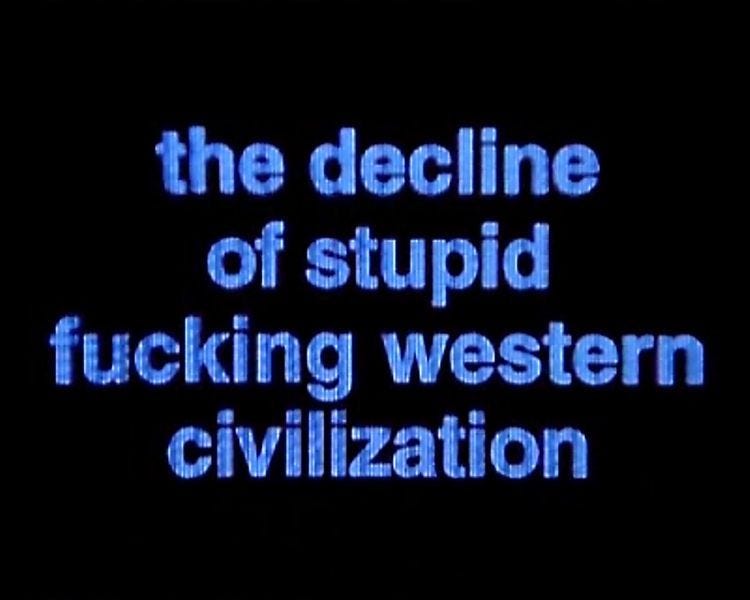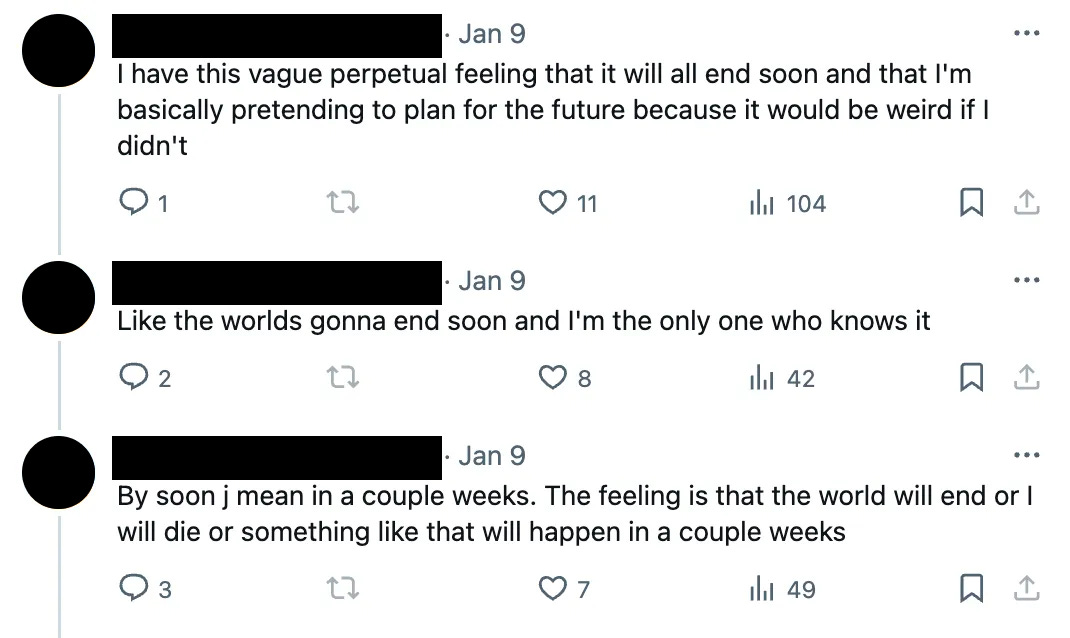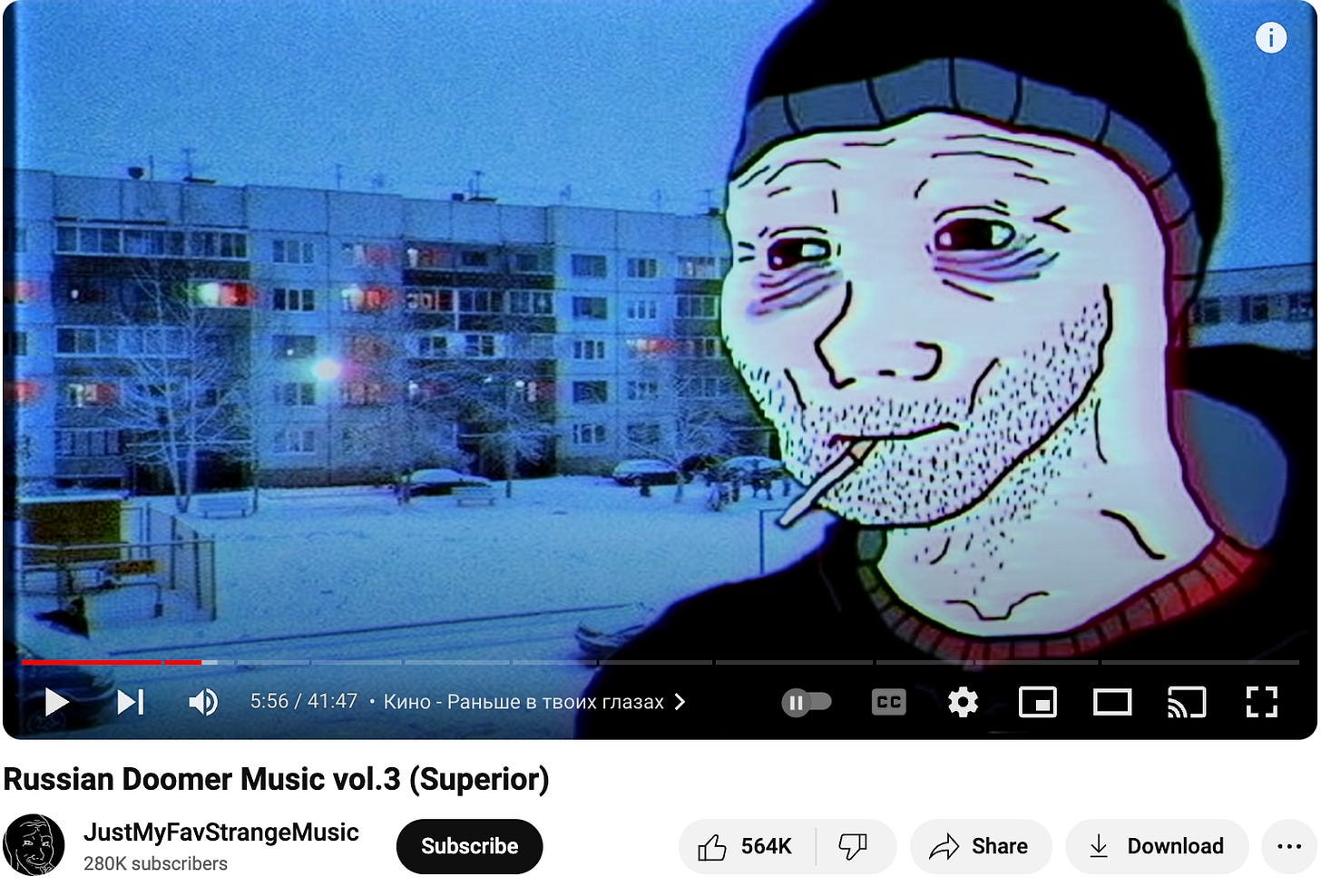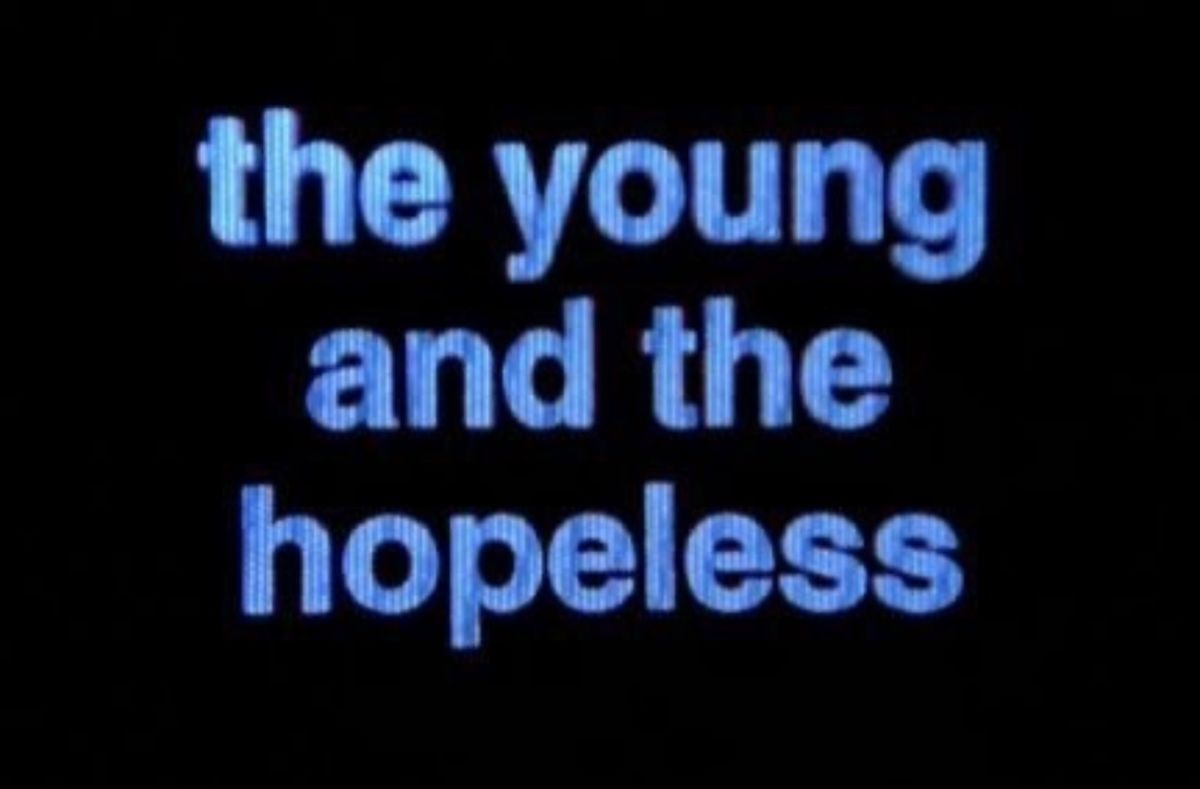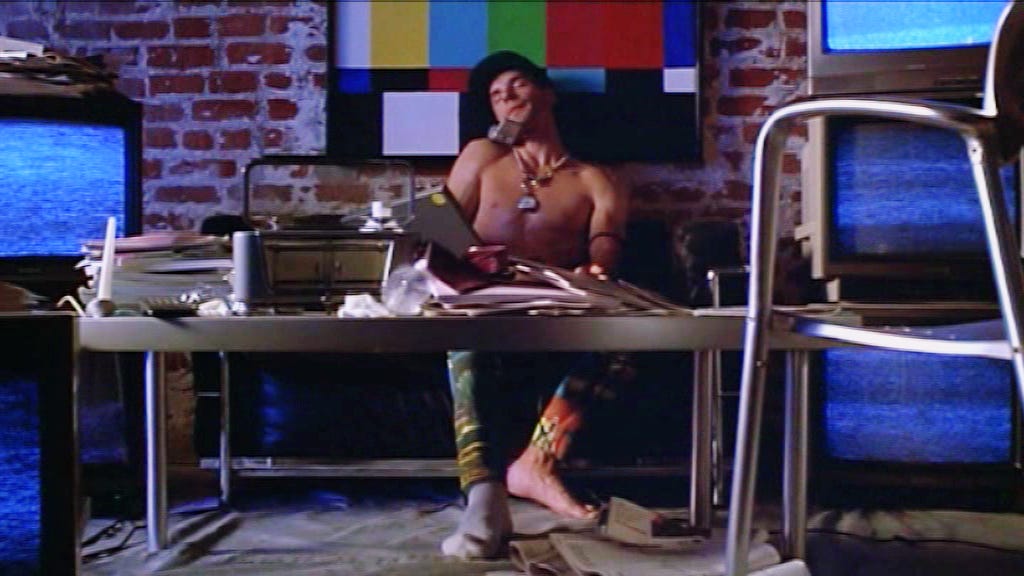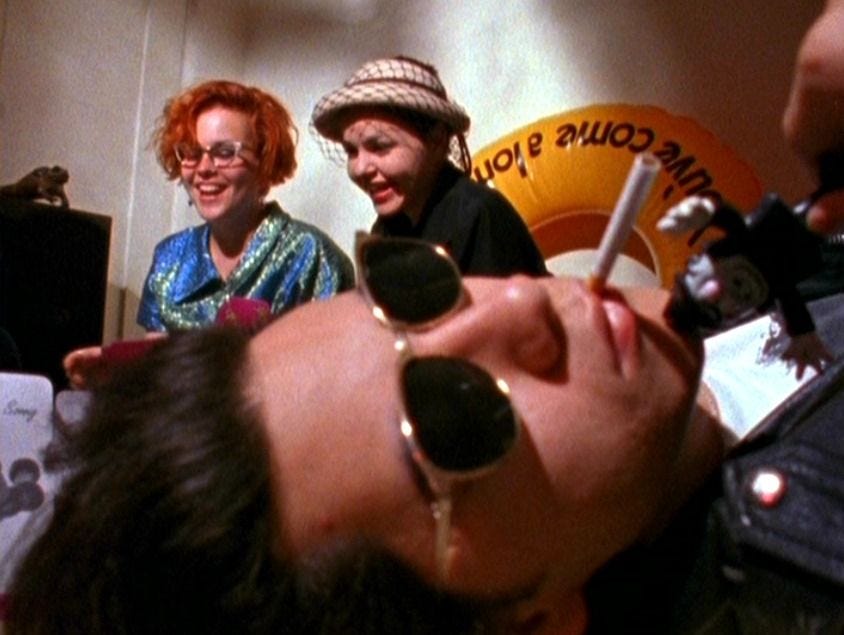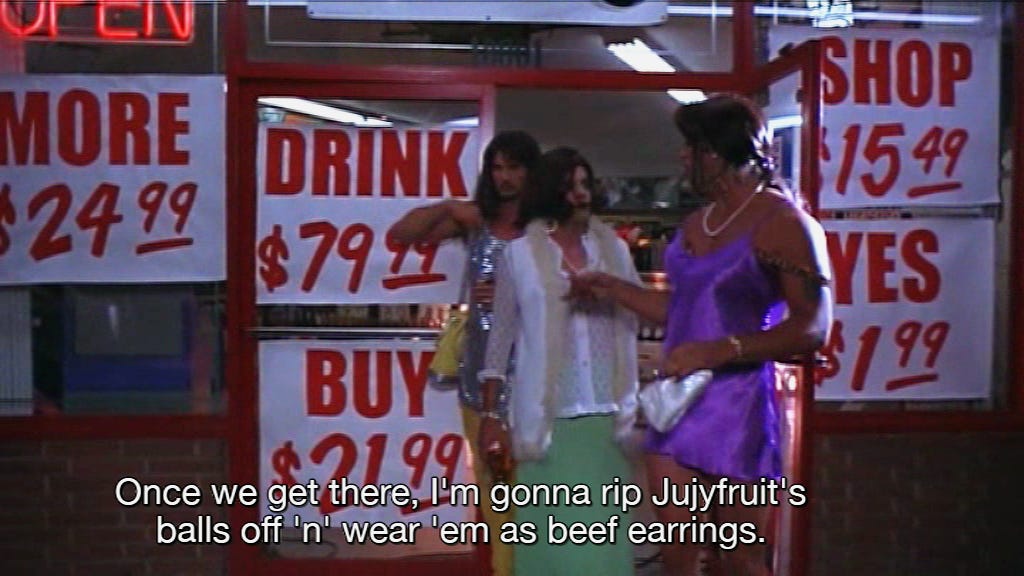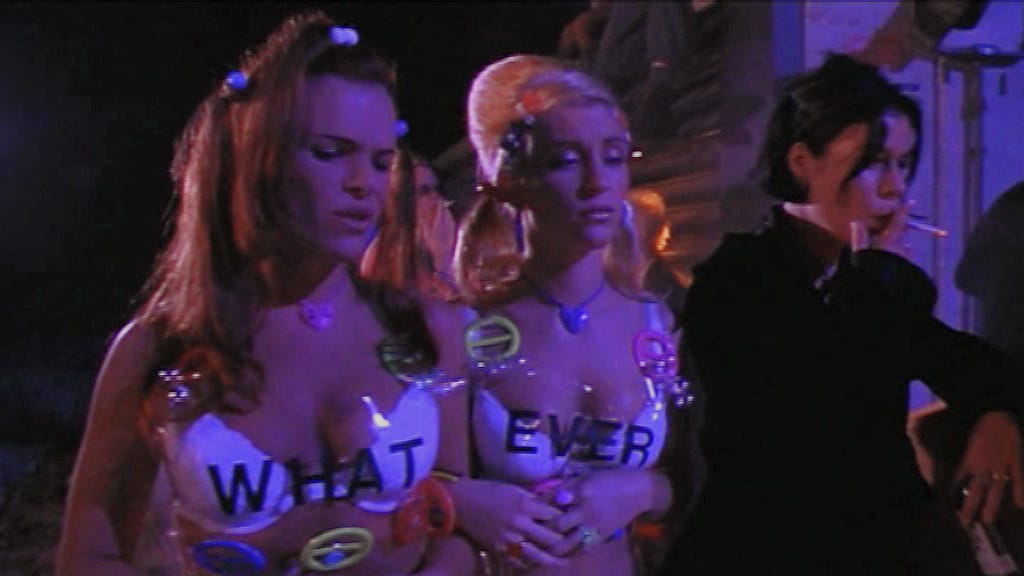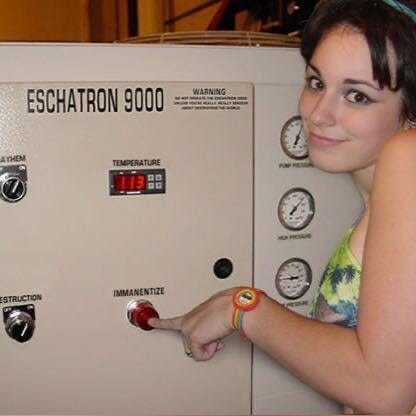If I may, I would like to direct your attention to three absolutely iconic films from director Gregg Araki, together referred to as the Teen Apocalypse Trilogy: Totally F***ed Up (1993), The Doom Generation (1995), and Nowhere (1997).
(These are links to the full movies free on youtube btw if you want to watch)
These mostly1 consist of stylish queer LA club kids doing drugs, watching TV, and languidly waiting for the world to end on increasingly insane looking sets. Throughout his filmography his waifish characters form a sort of one-of-each catalogue: gay, bisexual, asexual. We’re dominatrixes, we’re a thruple, we’re twins that can psychically tell when the other one is horny. Got a problem with that? And the plots—basically non-existent as they are—are punctuated with an uncomfortably large number of graphic sex scenes.
The movies launched to mixed reception (The Doom Generation was apparently among the 57 out of 10k+ movies that famed film critic Roger Ebert awarded zero stars), but they now comfortably live in the category of cult classics. They’ve been getting a wave of attention in the past few years and people have started referring to Araki as the spiritual godfather of bisexual lighting, which… is probably true.
One of my favourite examples of Araki’s sensibility is how he basically only considers looks in his casting choices: “this man can barely stammer out his lines, but hey, he has one blue and one green eye so...”
If I remember correctly, Araki said in an interview that these movies were partially made as a queer response to the John Hughes style teen movies of the 1980’s; like a shadow consisting of all the things that they didn’t show.
The overall effect that they accomplish is a deep sense of nihilistic, grim bleakness; candy-colored and shot through camcorders. Nowhere often referred to itself in marketing materials as Beverly Hills 90210 on acid, but if these movies are on acid then unfortunately they seem to be having a bad trip:
DARK: I feel like I'm sinking deeper and deeper into quicksand, watching everyone around me die a slow, agonizing death. It's like we all know, way down in our souls, that our generation is gonna witness the end of everything. You can see it in our eyes. It's in mine.
DARK: Look.
DARK: I'm doomed.
DARK: I'm only eighteen years old and I'm totally doomed.
There is something a little bit familiar in the bleakness of these movies. In real life I mean: I don’t know if you’ve noticed, but there is something morbid in the air.
I hear people say things like “I am convinced that I am not going to die by natural causes” and “I couldn't imagine bringing children into the world, this close to the end”.
Comment google-translated from Russian:
So you’re 26, soon to turn 27. You live in one of those soviet-looking apartments. In the summer it's too hot inside and in the winter it's too cold. You pay (if you're lucky) between 200-300 Euro the rent monthly (without taxes). You probably earn 200-400 Euros monthly. Basically you work to sustain the rent, but if you're lucky you get food from family and grandparents. I guess capitalism sucks as much as communism did. You have your girlfriend that earns to pay the taxes but there still no money for food. If you have children you're fucked.
I have a daughter but I gave it to my ex-gf parents because they were destroyed by her death. My ex died in a car accident I was also in: the driver is in a wheel chair. You keep changing your jobs hoping to manage to eat something but everywhere you go is the same. They say to go to a good high-school then following that with university will help you. My ass. Maybe I'm not smart enough, maybe just not lucky, I don't know. I'm trying so hard to be positive. Suicide does not appeal to me... YET.
I wish I could be just left alone with my gf on a farm just to work for my food and be free. Maybe that should be my next course of action. Maybe I should leave for a Western country but I don't want to get stabbed or bombed by strangers. Thanks for listening to my story whoever you are. I hope you try to stay positive, I hope you're doing better than me.
And maybe it’s for good reason too: a staggering number of plausible and semi-plausible doomsday scenarios seem to be emerging all at once.
Nuclear powers are butting heads
Atmospheric carbon is continuing its unabated rise
Artificial Intelligence researchers are bandying around their P(doom) numbers.2
Aliens are the topic of congressional hearings for some reason

Doom has been in the groundwater ever since apocalypse cults sailed over on the mayflower and founded this great nation. But it appears to be the case that the cultural power of Christianity in America has cooled off considerably since the time of these movies: it just feels so much less salient.
ALYSSA: Do you know what today is?
MONTGOMERY: Friday?
ALYSSA: No, dodo-bird. It's Armageddon Day. The day the world is supposed to end. Like have you heard of "The Rapture"?
MONTGOMERY: The Siouxsie and the Banshees album?
Maybe it’s just because there’s less of a reason to believe in God when we no longer need him to to justify our anxieties.
In his absence, we’re left with nothing but completely secular and atheist eschatologies.3
I think that the reason for the parallels between now and the early 90’s is actually pretty clear, but idk how to do spell it out without bringing up something that everyone has zero interest in thinking about so… let’s just rip off the bandaid here: I am once again comparing AIDS and Covid-19.
MICHELE: It's government-sponsored genocide. Biological warfare. I mean, think about it. A deadly virus that spread only through premarital sex and needle drugs? It's like a born-again Nazi Republican wet dream come true.
What, Covid-19? That was like 2 years ago, we’re over that now.
Just to put it into perspective a little: there have been something like 700,000 AIDS deaths in the US spread out over the past ~40 years. In comparison, 1,104,000 people died in the first 3 years of Covid-19 before they stopped reporting the numbers. On top of that, something like up to 2–4x that amount are still living with persistent health issues, and every single person experienced a dramatic disruption of their life because of the lockdowns.
The feelings this niche group of queer 90’s teens experienced are now a global phenomenon, and there is much psychic debt yet to be paid.

So why would deadly diseases lead to grim attitudes?
The gist of this neat paper, which examines the PTSD symptom “a sense of foreshortened future”, is that when traumatic events violate our expectations so extremely that our entire model of the way the world works is broken, we lose faith in the nature of reality and our ability to know anything about it.
These diseases turned our lives upside down and made it clear that we were fundamentally wrong about how scary a place the world is. And if you cant trust yourself enough to make predictions about the future, the result is that it feels like there is no future.

As you might imagine, none of the Teen Apocalypse Trilogy movies end in anything other than doom for the main characters.
But I’m no Gregg Araki; I’m a total sucker for leaving things on a hopeful note, no matter how much of a stretch it turns out to be.
Let us turn our attention to another 90’s HIV era classic: the play Angels in America, and in particular the character Harper Pitt. She is trapped in a loveless marriage with a closeted gay mormon man who keeps gaslighting her.
Here is an excerpt from a drug induced hallucination where she’s talking to a travel agent called Mr. Lies:
HARPER: Antartica, maybe? I want to see the hole in the ozone.[…] I feel that something's going to give. It's 1985... fifteen years to the third millennium. Maybe Christ will come again or maybe the troubles will and the end will come. And the sky will collapse and there'll be terrible rain and showers of poison light. Or maybe my life is really fine... maybe Joe loves me and I'm only crazy thinking otherwise. Or maybe not. Maybe it's even worse than I know. Maybe I want to know, maybe I don't. The suspense, Mr. Lies, it's killing me.
I mostly like her because she spends the entirety of the play worrying about the ozone layer in a way that seems fully identical to a modern person worrying about climate change. I also love how they refer to the Millenium in such breathless, ominous terms (the first half of the play is called The Millenium Approaches)
One of the final scenes of the play is Harper’s monologue: As she finally abandons her loveless marriage and manages to move forward, she finds a newfound sense of hope:
HARPER: Night flight to San Francisco; chase the moon across America. God, it’s been years since I was on a plane. When we hit 35,000 feet we’ll have reached the tropopause, the great belt of calm air, as close as I’ll ever get to the ozone. I dreamed we were there. The plane leapt the tropopause, the safe air, and attained the outer rim, the ozone, which was ragged and torn, patches of it threadbare as old cheesecloth, and that was frightening. But I saw something that only I could see because of my astonishing ability to see such things: Souls were rising, from the earth far below, souls of the dead, of people who had perished, from famine, from war, from the plague, and they floated up, like skydivers in reverse, limbs all akimbo, wheeling and spinning. And the souls of these departed joined hands, clasped ankles, and formed a web, a great net of souls, and the souls were three-atom oxygen molecules of the stuff of ozone, and the outer rim absorbed them and was repaired. Nothing’s lost forever. In this world, there’s a kind of painful progress. Longing for what we’ve left behind, and dreaming ahead. At least I think that’s so.
Moving forward is the only way to find a resolution, but it can be hard to keep going if you can’t see a way. The only choice we have is to go about things day by day, put one foot in front of the other, and try to have faith that things are going to work out.
…
I guess.
Which, to the uninitiated, is their personal estimation of how likely the world is going to end because of their own work









